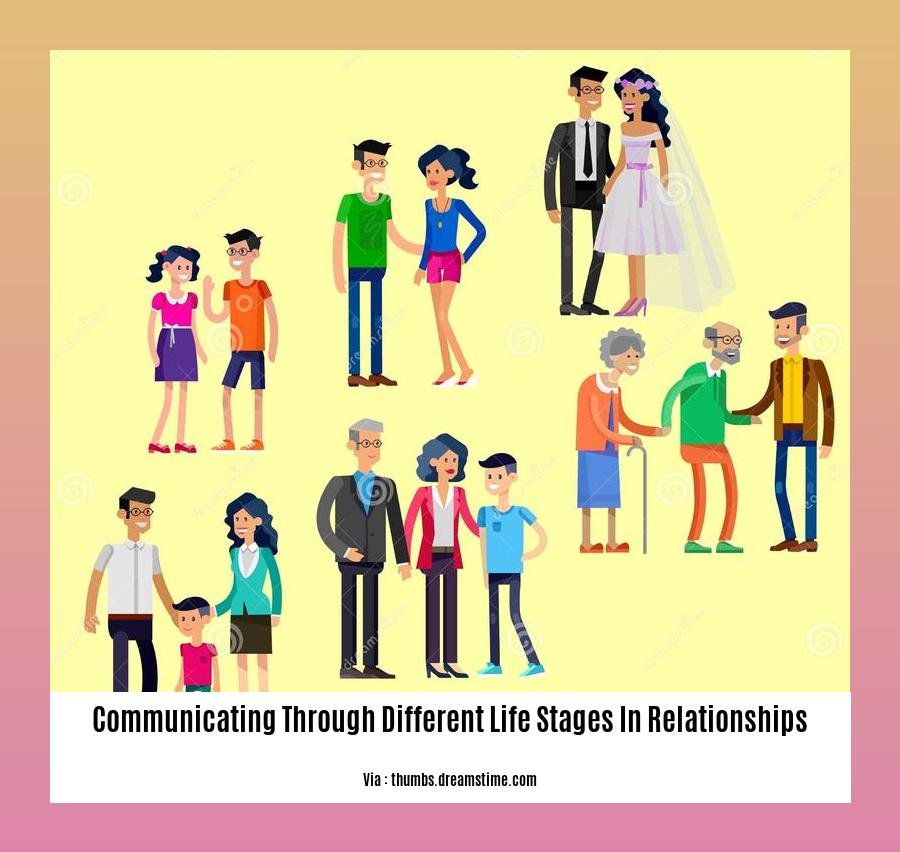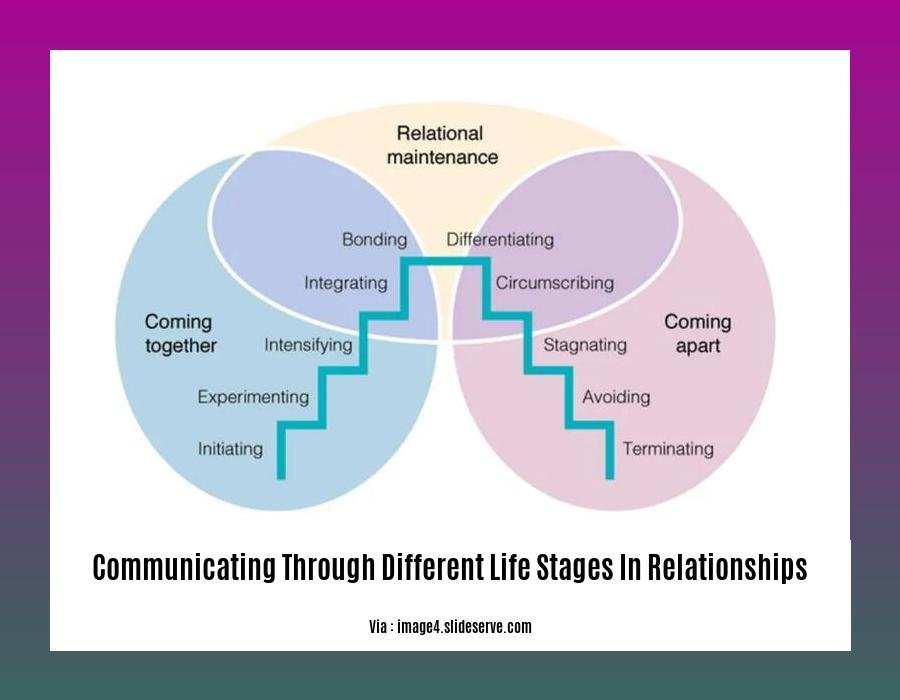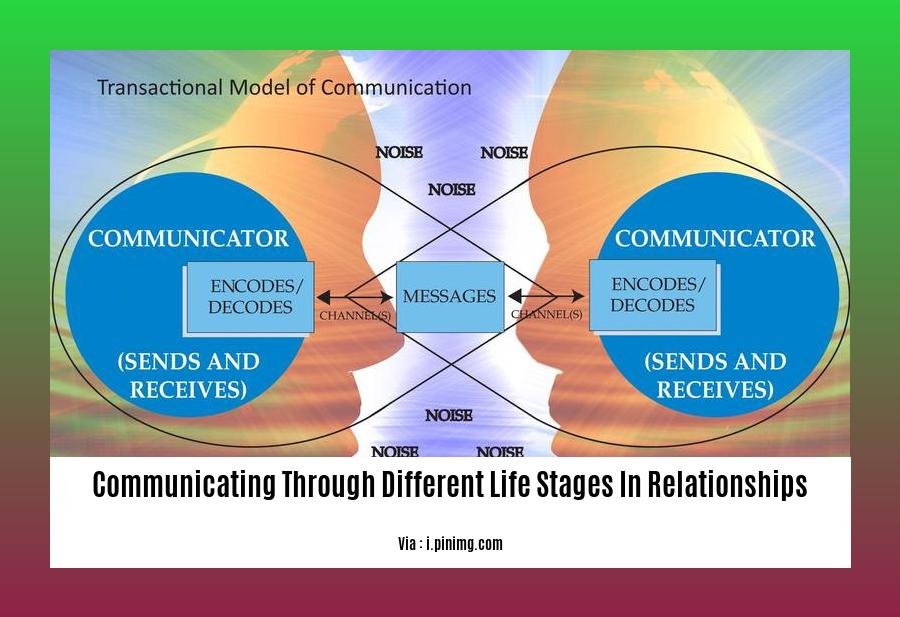Discover the art of effective communication through the evolving stages of relationships in our insightful article, “The Art of Communicating Through Different Life Stages in Relationships.” Our expert guidance will illuminate the unique challenges and opportunities present in the Honeymoon Stage, Commitment Stage, Adjustment Stage, and Acceptance Stage, empowering you to navigate these transitions with grace and connection.
Key Takeaways:

- Relationships go through different stages, each with distinct challenges and opportunities.
- The Honeymoon Stage is marked by intense romantic feelings and overlooking flaws.
- The Uncertainty Stage involves examining differences and potential doubts about the relationship’s future.
- The Adjustment Stage requires negotiation, compromise, and effective communication.
- The Acceptance Stage brings an understanding and appreciation of each other’s imperfections.
- The Commitment Stage involves a long-term pledge to support each other through challenges and growth.
- Understanding these stages helps couples adapt their communication, resolve conflicts, and strengthen their bond.
Communicating Through Different Life Stages in Relationships
As relationships progress through various stages, navigating communication effectively becomes paramount for maintaining connection and fostering growth. Here’s a guide to help you communicate through different life stages in relationships:
The Honeymoon Stage
- Embrace Openness: Share your thoughts, feelings, and dreams without hesitation.
- Listen with Empathy: Actively listen to your partner’s perspectives and validate their experiences.
- Prioritize Connection: Make time for meaningful conversations and engage in activities that deepen your bond.
The Uncertainty Stage
- Acknowledge Differences: Recognize and discuss differences in values or communication styles.
- Seek Understanding: Ask open-ended questions and strive to understand your partner’s viewpoints.
- Compromise and Negotiate: Work together to find solutions that accommodate both your needs.
The Adjustment Stage
- Establish Boundaries: Define clear boundaries to foster respect and avoid misunderstandings.
- Practice Accommodation: Adjust your expectations and behaviors to accommodate your partner’s needs.
- Communicate Regularly: Maintain open and honest communication to address any evolving challenges or areas for growth.
The Acceptance Stage
- Embrace Flaws: Accept and appreciate your partner’s imperfections as part of their individuality.
- Celebrate Differences: Focus on the unique qualities that make your relationship special.
- Foster Gratitude: Regularly express appreciation for your partner’s presence and support.
The Commitment Stage
- Communicate Intentions: Clearly articulate your commitment to the relationship and discuss long-term goals.
- Resolve Conflicts Constructively: Engage in respectful discussions and seek solutions that strengthen your bond.
- Maintain Intimacy: Continue to nurture emotional and physical intimacy through open communication and shared experiences.
Remember, communication is a dynamic process that requires ongoing effort and adaptation throughout the different stages of a relationship. By embracing these principles, you can foster a fulfilling and resilient connection with your partner that withstands the test of time.
Maintaining strong communication is crucial as life progresses. Explore ways to keep communication strong as your situations evolve: ways to keep communication strong as your situations evolve. Discuss changing needs and roles as you navigate through life’s stages: discussing changing needs and roles as you progress through life. Discover tips for adapting communication styles over time: tips for adapting communication styles over time.
The Adjustment Stage (After Two Years)
In a relationship, the adjustment stage (after two years) is all about finding a balance between independence and togetherness. It’s a time to figure out what works for you as a couple and what doesn’t.
Key Takeaways:
- Communication is key: Talk to each other about your needs, wants, and expectations.
- Be willing to compromise: You won’t always get your way, so it’s important to be willing to meet your partner halfway.
- Don’t be afraid to seek help if you need it: A therapist can help you navigate the challenges of this stage.
This is a time when you may start to see some of the cracks in your relationship. It’s important to remember that this is normal and that all relationships go through this stage. The key is to communicate openly and honestly with each other and to be willing to work together to overcome any challenges.
Here are a few tips for successfully navigating the adjustment stage (after two years):
- Make time for each other. It’s easy to get caught up in the day-to-day grind, but it’s important to make time for each other. Go on dates, spend time talking, and just enjoy each other’s company.
- Be supportive of each other. Life can be tough sometimes, so it’s important to be there for each other through the good times and the bad. Offer your support, encouragement, and love.
- Be patient. Relationships take time and effort to build. Don’t get discouraged if you don’t see results immediately. Just keep working at it and things will eventually fall into place.
Most Relevant URL Source:
- The 4 Stages of Relationships
The Acceptance Stage (After Five Or More Years)
Once a couple surpasses the five-year mark, their relationship evolves into a comfortable and secure Acceptance Stage. They’ve navigated the ups and downs, and a profound trust has solidified.
Key Takeaways:
- Embrace each other’s quirks and flaws.
- Celebrate your partner’s strengths and weaknesses.
- Establish a shared vision for the future.
- Nurture intimacy and make time for each other.
- Practice active listening and open communication.
- Seek professional help if needed.
In this stage, couples prioritize quality over quantity. They appreciate each other’s presence, not feeling the need to constantly impress or prove love. Their bond is unbreakable, standing the test of time.
Most Relevant URL Source:
- The 5 Stages of a Relationship – And How to Stay Happy in Each One











